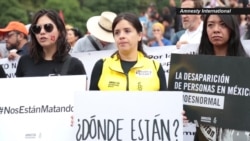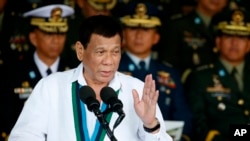The rights group Amnesty International says the world’s most powerful leaders have made angry political speech a normal behavior.
Amnesty International released its report on the human rights situation in 159 countries Thursday.
The report says leaders in Egypt, The Philippines, Venezuela, China, Russia and the United States have harmed the rights of millions of people by their use of such language.
Margaret Huang is executive director for Amnesty International USA.
She pointed to Philippine leader Rodrigo Duterte as an example in connection with his anti-drug trafficking campaign.
“In the case of the Philippine President [Rodrigo] Duterte he has actually called on people to go out and kill those they suspect to be drug dealers,” Huang said.
The report also criticized U.S. President Donald Trump in connection with his effort to deny travel visas to people from Muslim-majority countries with high levels of terrorism. It described the action has “hateful.” It also criticized European leaders for being “unwilling” to deal with the problems of migration to their countries.
Salil Shetty leads Amnesty International. He said the world saw how bad a society can behave when it is encouraged to hate, fear and blame minorities. The main example was, in his words, “…the military campaign of ethnic cleansing against the Rohingya people in Myanmar.”
Report targets reproductive rights
The report denounced what is known as the Mexico City Policy of the U.S.
The policy bans U.S. State Department and USAID funding to international groups that provide abortions or abortion support. The Trump administration has expanded the measure to include all U.S. international health care funding. The administration says the policy is designed to protect the lives of unborn babies around the world.
John Lotspeich is with Marie Stopes International, a non-governmental group that supports contraception and abortion services.
He says that birth control measures are less available in places like Madagascar, Uganda and Zimbabwe because of the loss of funding.
The group says the policy has cost organizations like theirs millions of dollars.
The U.S. State Department, however, says that funding for most health groups continues. These include non-governmental organizations and government agencies. The department said this is because they have met the requirements of the policy.
Amnesty: free speech also suffered in 2017
The rights group also said that free speech suffered, especially in China, Egypt and Turkey.
Amnesty International’s Huang noted that her own group had been affected.
“Turkey has imprisoned more than 50,000 people over the last couple of year including both the chair and director of Amnesty Turkey,” she said.
In Turkey, she said, there was an effort, in her words, “to arrest anyone who has been critical of the government, which is the same kind of situation we are seeing in Egypt and China.”
However, the report praised movements such as the Women’s March in the United States and the international #metoo campaign. The international protests and social media campaign have brought additional attention to the issues of sexual abuse and harassment worldwide.
Each year, Amnesty International releases its report called “The State of the World’s Human Rights.”
This year’s report of over 400 pages discusses human rights issues such as armed conflict, the justice system and poverty all over the world.
The 2017 report also drew attention to government efforts to cut costs saying this was a human rights issue. The report noted that such measures hurt people’s ability to get education, health services and housing.
I’m Mario Ritter.
Mariama Diallo reported this story for VOA News. Mario Ritter adapted it for VOA Learning English. Caty Weaver was the editor.
We want to hear from you. Write to us in the Comments section, and visit our Facebook page.
_______________________________________________________________
Words in This Story
encourage – v. to make (someone) more likely to do something
funding – n. money that is used for a special purpose
abortion – n. a medical procedure used to end a pregnancy
contraception – n. things that are done to prevent pregnancy
harassment – n. the act of repeatedly annoying or bothering someone






